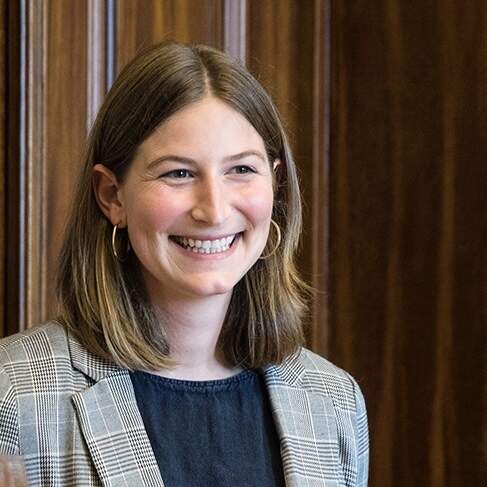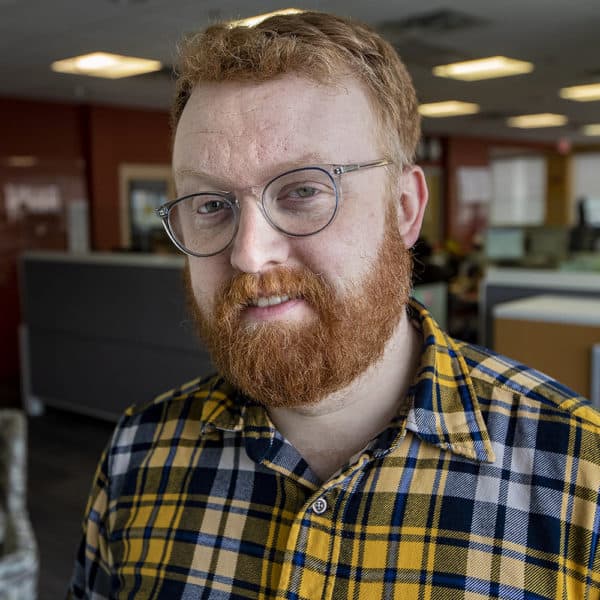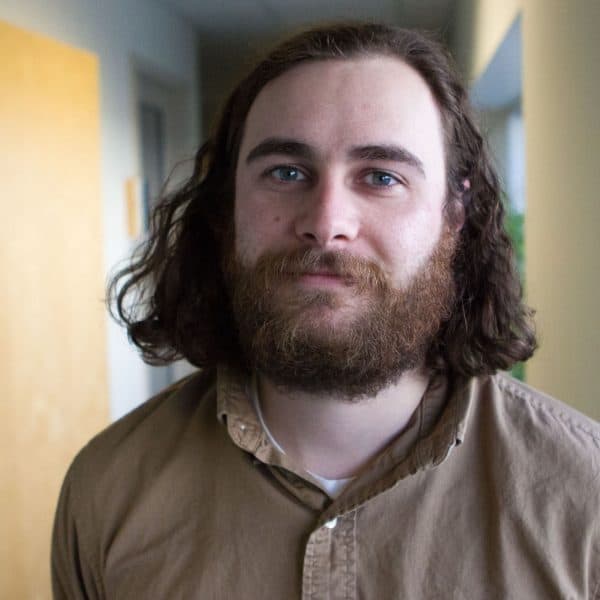Advertisement
Chapter 6: Hope
Resume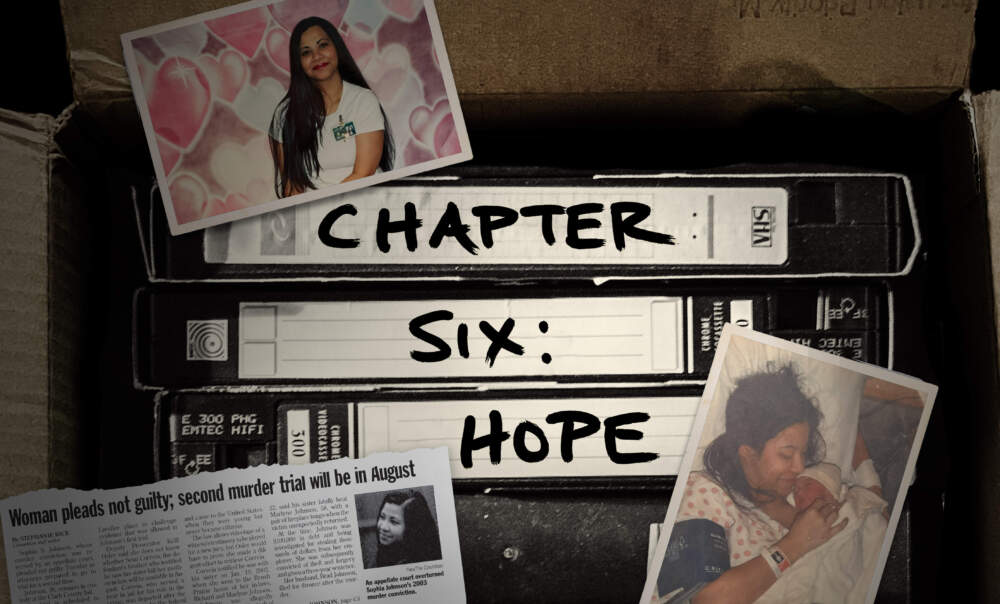
The jury has reached a verdict: Sophia is found guilty of first-degree murder.
At sentencing, Sophia hears victim impact statements, including one delivered by the woman raising her son.
She is sentenced to 43 years in prison, and just as she’s settling into that fate, she gets a call from her lawyer saying that she’s won the right to a new trial.
If you have questions about the case, the people at the center of this story, or anything else about this series, we want to hear them. Email beyondallrepairpod@gmail.com with a voice memo or written message.
Consider becoming a "BEYOND" member today:
This show is made at WBUR, a public radio station, which means we cannot make shows like this without public support. Join our "BEYOND" membership program and receive early access to some of the final episodes in the series, extra episodes, and a private feed of the show for ad-free listening: wbur.org/beyond
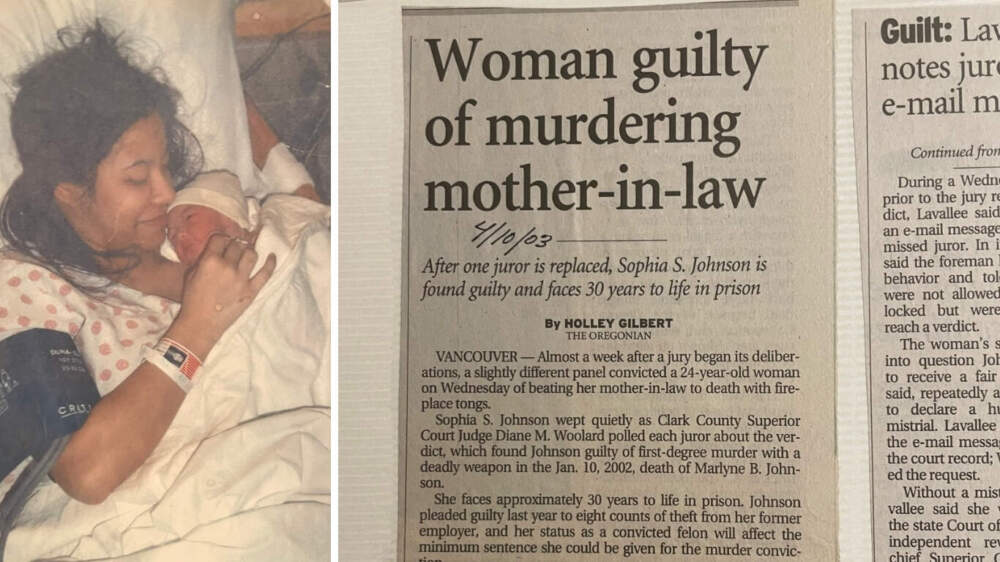
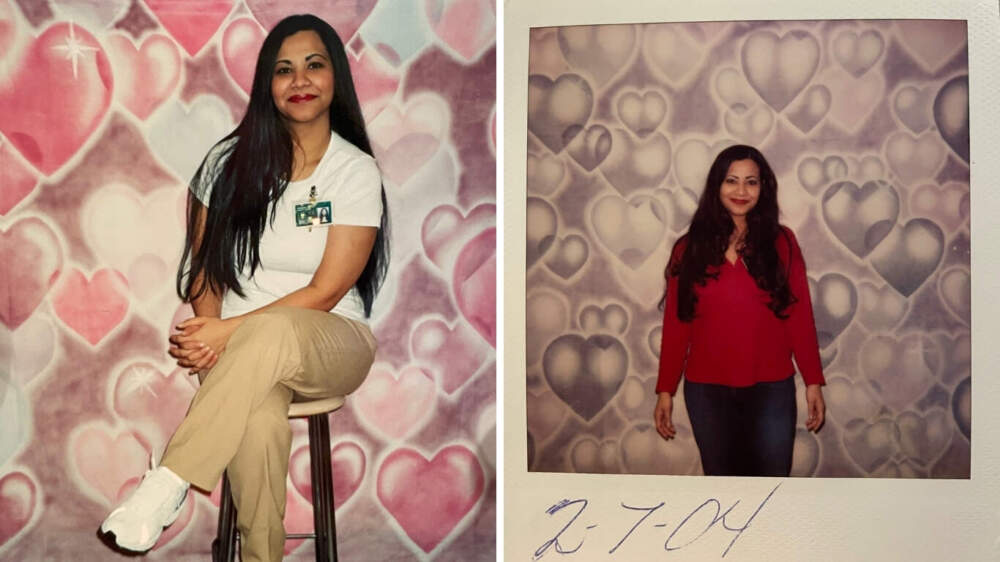

Read the transcript
Chapter 6: Hope
Heads up. This show contains descriptions of violence and strong language.
Last time on Beyond All Repair…
Brad Johnson: Basically he says, I believe Sophia is stealing from me.
Sophia Johnson: I went on a rampage. I felt wronged, I felt cheated, and it felt slimy.
Brad Johnson: I don't think you should marry her.
Sophia Johnson: And of course, I went ahead and in turn did the exact same thing. I was wrong. I cheated him and I became slimy.
Rick Buckner: You know, she was looking for money. That was her big motivation right there.
Brad Johnson: The tornado just kept getting bigger and bigger.
Shane Correia: Yeah. This is the walls closing in, man.
Sophia Johnson: my primary concern was making sure this money was paid back and that this baby that I'm pregnant with would be okay.
Judge: Good afternoon. Good afternoon. I have been handed the verdict forms by the jury in the matter of State versus Sophia Johnson…
It's April 9th, 2003. Over the last two weeks, 12 people have heard from detectives and forensic analysts. They've heard from heartbroken family members of Marlyne Johnson. And they've heard from supposedly the only witness to her murder.
Sean Correia: It turned out to be… my sister.
Now, after dozens of hours in the deliberation room, these dozen people have reached a decision as to whether or not Sophia Johnson... beyond a reasonable doubt... bludgeoned Marlyne to death.
Sophia Johnson: I already felt like I was doing a death walk. It was so weird because I had walked these hallways now so many times.
Sophia remembers being escorted down a dimly lit hallway, down three flights of stairs, down another hallway, to an elevator.
Sophia Johnson: And when you get out, it's the courthouse. It felt like it was a full house.
It was. People shifting nervously, looking around, whispering to each other. I've watched this footage many times, thanks to those VHS tapes of the trial Sophia sent me. What do THEY think, I wonder, as I try to make out the grainy faces in the gallery. Is that Grace, Sophia's mom, sitting next to the woman in the yellow jacket? Is the woman in bright pink with the notebook Lyn Page, Richard Johnson's friend? And where’s Brad?
Sophia's chosen a black blazer for decision day. Her lawyer Therese Lavallee, is in a tan, pleated jacket that reminds you -- IF you had forgotten for a moment -- that this was 20-plus years ago. But it still feels fresh for Sophia.
Sophia Johnson: Therese looked over at me and she said, let's not kid ourselves. This is not gonna be good.
Therese is furiously taking notes. She looks PISSED. A lot has already gone down that day in court. I'll get there. But right now, the verdict.
Judge: We the jury find the defendant Sophia S. Johnson guilty of the crime of felony murder in the first degree…
Sophia Johnson: They said guilty. And I just, I cried. I couldn't even help it.
The camera stays on the judge. But Sophia says she bowed her head. She thinks Therese may have squeezed her shoulders. And then, they listened to those 12 jurors reiterate their decision, one by one.
Juge: Ms. Moore, was this your verdict in the verdict of the jury….
Sophia was taken back to the elevator, back down the hallway, UP the three lights of stairs, down the other hallway... back to jail. She says one of the officers escorting her tried to comfort her.
Sophia Johnson: And he said, you know, Johnson, juries get it wrong all the time. They just do. Ask your attorney to get you an appellate attorney. And I said, why bother? He said, because as long as you're alive, there's hope.
I'm Amory Sivertson. From WBUR and ZSP Media, this is Beyond All Repair. Or... is it?
Chapter 6: Hope.
Danielle (ACTOR): I have known the Johnson family for over thirteen years, when they say Marlyne was the glue that held this family together, that is no exaggeration.
A couple months after the verdict was read, Sophia was called back to court for sentencing.
Sophia Johnson: And they had something called victim impact statements. I'd never heard of that before.
This is when the people most affected by a crime get to speak to the judge, and -- if they want -- directly to the decidedly guilty person.
Sophia Johnson: To add insult to injury, it was Danielle that read it on behalf of the family.
Danielle (ACTOR): I have seen them shed more tears than any one person should have to shed in a lifetime.
The reading of these statements wasn't included in the trial footage Sophia sent to me, but I do have written copies from the court records. So you're hearing a colleague read the words of a woman named Danielle Ruestig -- described at the top of her statement as a friend of the Johnson family. But in recent months, she’d become MORE than a friend… to Brad Johnson… Sophia’s husband.
Sophia Johnson: You gotta know, I loved that.
Brad filed for divorce from Sophia just weeks after his mother was killed. But by this point, more than a year later, the divorce STILL hadn't been finalized.
Sophia Johnson: I'd still loved my husband at that time.
You may remember... that Sophia was 6 months pregnant when Marlyne Johnson was killed in January of 2002. Her son was born that April. Danielle, Brad's girlfriend, quickly became part of the baby boy's life. And a year or so later in court, she’d signal to Sophia that her victim impact statement was on behalf of him too.
Danielle (ACTOR): The day that Marlyne’s son has to tell his now one-year-old son that it was his mom who killed his grandmother? That is when the tragedy will be lived all over again.
Sophia Johnson: She had my husband, she had my son. She had the life that was supposed to be mine…I cannot believe it is your 19th birthday today. I am happy and I am sad all at the same time.
Every year, Sophia makes a video like this for her son… Eathen.
Sophia Johnson:I hope that, wherever you are, that you know just how much you're loved.
Eathen has never seen these videos. Sophia’s never sent them. Wouldn’t even know WHERE to send them. It’s possible Eathen will NEVER see them…
Sophia Johnson: It is hard to have a conversation with a person that you've never met that you love so much.
And it's possible Sophia will keep having these one-sided conversations -- monologues, really -- for years to come. But there's something she has for Eathen that no one else does.
Sophia Johnson: I cannot help but go back to the day that you were born.
The story of his ACTUAL birth-day.
Sophia Johnson: It's the only real memory of you that I have.
I know this story. Not the version she hopes to tell Eathen someday: the one that starts in a hospital. The version I heard, starts in a jail cell.
Sophia Johnson: Being pregnant with him while incarcerated truly saved my life when this happened. It was too big. It was too overwhelming. I just, truly, I wanted to disappear. So the only thing I could focus on was keeping this baby safe and healthy.
Sophia says she was taken to the hospital the night before Eathen was born, after 3 days of contractions in the jail's medical ward. Two male correctional officers brought her there, and stayed in her hospital room the whole time, while an armed guard stood just outside the door.
Sophia Johnson: One of the officers, he was just a douchebag. He, uh, made a real scene of saying that he thought I was faking my labor contractions, that he'd never heard of someone being in labor for or having contractions for that long.
Eventually, Sophia says, a nurse came in and let her take a shower.
Sophia Johnson: I was not allowed to take a shower for three days while I was in the medical unit and really wanted to just feel clean.
As Sophia was getting out of the stall, she says she saw something... startling. Herself. In a full-length mirror. For the first time since being arrested 3 months earlier.
Sophia Johnson: I couldn't believe how, how large my stomach was, and it looked so beautiful. I'd never seen it and how scared I was that this would be the first time I would see this. And it would also be the last time.
The next morning, Eathen Marly Johnson was born. Marly is a tribute to his grandmother, Marlyne.
Sophia Johnson: I heard his tears turn into a whimper and then silence followed. I checked his fingers and his toes to make sure they were all there. I never stopped talking the whole time. He was quiet and his eyes were open. He was looking at me and listened to the sound of my voice. I stroked his belly, his face, and his back. I held his hand and ran my finger over his little tiny feet. He was perfect by far the most beautiful baby I had ever seen. My heart was full of love. Making him and bringing him into the world safely was the greatest thing I had ever done. It will remain that way until I die.
This is an excerpt of an essay Sophia wrote when Eathen was about 4 or 5 months old, she tells me. She wrote it in jail, but she recorded it within the last few years. I didn't know this essay or recording existed. Shane, Sophia's youngest brother, told me about it. Initially, Sophia didn't want anyone other than EATHEN hearing it. But Shane convinced her to send it to me, with THIS voice note…
Shane Correia: Sophia. The other thing here is that this podcast may honestly be the only thing you ever get to say to Ethan, so I think it's important for you to share that. And this might be your only opportunity to.
The question of what EATHEN thinks... looms large -- what he grew up hearing about Sophia, how he's made sense of it all for himself.
Eathen will be 22 years old this April. The same age Sophia was when she got pregnant with him. Of those 22 years, Sophia says she's spent 40 minutes with him. Total. The FIRST 40 minutes.
Sophia Johnson: Which, if the jail had known, the doctors and the nurses would've gotten in trouble because they didn't want me to even hold him. They said, take him immediately.
One of the doctors offered to take a few pictures, which Sophia has sent to me. They're the only pictures Sophia has of her and Eathen together. In one of them, she beams down at the little red-faced peanut resting on her shoulder. Sophia looks proud. At ease. And, for a moment, totally unaware of what was coming. Here's more from that essay.
Sophia Johnson: When the midwife touched the top of my shoulders, I looked up. We have to take him now, Sophia. Why? I asked. Brad is here, she said. He's waiting to see his son.
It wasn't just Brad there, Sophia told me. It was Brad and his new girlfriend, Danielle, whom he had started dating sometime in the 3 months since Sophia's arrest.
Sophia Johnson: They were at the hospital already waiting for him at the nursery. And every time they'd come in my room, they would ask, is there anything they could do? I would always say, just go kiss my son.
Two days later, Sophia and Eathen both left the hospital. Eathen went home with Brad and Danielle. Sophia went back to jail.
Sophia Johnson: This is not goodbye, Eathen. This is, I'll see you later.
I will never forget what it was like hearing Sophia tell me about the birth of her son. And as much as I’ve tried to set this story aside when considering everything else -- her brother Sean's testimony, the Johnsons’ anecdotes about her, the embezzlement -- it is hard to understand how a woman who loves THIS much, could take another person's life. It doesn’t mean she didn’t.
Danielle (ACTOR): No sentence would be strong enough for Sophia, but we hope that justice will prevail in this matter.
One year later, Danielle… the woman who would go on to marry Sophia’s soon-to-be-EX-husband and raise her son was delivering a statement in court. Trying to ensure, on behalf of the Johnsons, that Sophia wouldn't be seeing that son... for a good long time.
And Therese, Sophia's lawyer, tried to brace her.
Sophia Johnson: She said, the sentencing recommendation, Sophia, is really high and this judge is gonna give you every single day of it. I said, well, what is it she said? 517 months. 517 months. What is that? She said, 43 years.
43 years. Sophia wouldn't just be missing Eathen's childhood. He'd be middle-aged by the time she got out of prison. As the judge announced the decision, she added: "She never needs to be on the streets again."
Sophia was sent to a prison in western Washington. Really, she was sent BACK there. By the time her murder trial began in 2003, Sophia had already started serving a 3-year sentence for the EMBEZZLEMENT I mentioned in the last episode. She had essentially pleaded guilty to stealing the 70-ish-thousand-dollars she was proven to have taken from her former employer, County Communications. It's actually much more complicated than that, but on paper, her plea was as good as guilty in terms of what it would mean for her going forward. And it would come back to bite her.
But right now, she was hearing Detective Rick Buckner's voice in her head...and a warning he'd given her when she was first arrested for Marlyne's murder.
Sophia Johnson: What he said is, I hope for your sake you didn't do this. ‘Cause you're not gonna like prison.
After her sentencing for the murder, Sophia was moved from the medium security part of the prison... to MAXIMUM. And the level of competition there, she says, was FIERCE.
Sophia Johnson: They were doing three-legged races. They were doing egg toss. And it was officer and inmate playing on the same team.
Shortly after getting back to prison, the facility was having… a field day of sorts, Sophia says. There she was, standing across from a sergeant. In prison. About to do an egg toss.
Sophia Johnson: And he is like, okay, what's your name? Johnson. Okay Johnson. I like to win. Do you like to win? Because if not, you're gonna need to switch with your neighbor.
Prison wasn't all one big egg toss, Sophia says, but I was honestly shocked at the way she described it.
Sophia Johnson:Great job, great roommate. I'm in classes that I love. I have a life.
Sophia worked in the kitchen, which was perfect because this woman LOVES to cook. She says she took a ceramics class, she was in the chess club...
Sophia Johnson: They had Toastmasters and I did that and loved it.
It's a speech club, basically. Women at this prison were also allowed to wear make-up and plain clothes. No more head-to-toe monochrome. They'd have picture days in the prison's gymnasium. Sophia's shown me a few pictures from her time there. In one of them, she's sitting on a stool in front of a backdrop of pink and white hearts… wearing a fitted white t-shirt, khakis, her characteristic red lipstick, and a confident smile. She sent this one to her mom, with whom she had only occasional contact at this time.
Sophia Johnson: And she said, I swear to God, I hate to say this, but you look like the poster child for prison. I'm like, what does that even mean? She's like, I don't know, but it just… how are you doing so good? And I didn't know how to answer her because I, I am doing good, I'm doing great, but probably because I've accepted my role, I've accepted my world.
It was a world without Eathen, her son, but it was also the best she could probably hope for, given that she'd be spending the next 43 years of her life there.
But then, about a year and a half into her sentence... Sophia got a phone call in prison.
Sophia Johnson: And I picked up the phone and Therese was excited.
Therese Lavallee, Sophia’s lawyer.
Sophia Johnson: And she said, Sophia, are you sitting down? And I said, I won, didn't I? She said, you won.
Sophia had WON… a new trial. More in a minute.
It's late January, 2005. Sophia is feeling more at peace in prison than anyone could have expected, and more than the people who believe she's a murderer would have ever WANTED… when her lawyer Therese calls… saying… that her murder conviction had been THROWN OUT.
WHAAAAT. Yes. It goes back to the day Sophia’s verdict was delivered… in April of 2003. Remember I said that a lot had already gone down in court that day? What had gone down... was THIS.
Therese Lavallee: I am also here to, again, request that this court direct a mistrial at this time.
A MISTRIAL. As in, Therese was asking the judge to START OVER. Because, the day before the verdict was reached, the judge had dismissed one of the 12 original jurors and replaced her with an alternate.
Therese Lavallee: I believe that what occurred yesterday, uh, is an interference with Ms. Johnson's right to a fair trial. It essentially amounted to reconstituting the original 12 jurors because we had a juror who, uh, was out of the same mindset of the majority of the rest of the jurors.
Therese is alleging that this juror was dismissed because she was preventing the jury from reaching a verdict. They were deadlocked, in other words, which… would normally… lead to a mistrial. The foreperson, or lead juror, said the dismissed juror was being difficult, emotional, uncooperative. The dismissed juror HERSELF told Therese...
Therese Lavallee: She indicated under no certain, uncertain terms that that was an absolute lie, that that never occurred, that anything that occurred within the jury room was simply the product of their deliberation.
This juror was IMPROPERLY dismissed, Therese claimed. The JUDGE'S response:
Judge: I refuse to stop the jury deliberations. I don't see this as being extraordinary and striking circumstances that would indicate a substantial injustice at this point.
At this point. But at a DIFFERENT point, nearly two years later, a different JUDGE... would find otherwise. That judge would also rule... that the BAILIFF in Sophia's 2003 trial had had improper communications with the foreperson of her jury. An injustice HAD occurred, this ruling indicated.
Sophia, amazingly, was getting a second chance. And her lawyer, Therese, would get a second chance at DEFENDING her. To a new jury. A new judge. In a whole new trial.
Judge: Mr. Kinnie, would you give an opening? Yes, sir.
It's now November of 2005. Sophia is back in the Clark County courthouse, facing a new prosecutor, too. Mike Kinnie. His prosecutorial presence isn't as… commanding as his physical one. He's soft-spoken, measured. The judge often has to ask him to speak up, for the recording.
Mike Kinnie: On January 10, 2002, sometime a little after 12:20 in the afternoon, Marlyne Johnson had completed her shopping…
And then there's Therese Lavallee, planting the same seed she hoped would take root in 2003.
Therese Lavallee: This entire case hinges on Sean Correia’s credibility.
The illegitimacy of Sean, Sophia's brother's, testimony.
Therese Lavallee: Sean Correia’s name permeates this trial.
But Therese had a couple other tricks up her sleeve this time. Witnesses she didn't have in 2003. Including a forensic expert named Kay Sweeney.
Therese Lavallee: And he won't tell you who committed this murder, but he will tell you who didn't…Sir, were you asked to review evidence relating to the death of Marlyne Johnson?
Kay Sweeney: Yes, I was.
Therese hired Kay Sweeney to give the evidence in the case a once-over, basically. See if he found anything that other forensic analysts HADN’T up to that point. Kay’s worked in forensics since the 60s. First, for the Seattle police department.
Kay Sweeney: So I was doing chemical analysis, I was doing trace evidence, I was doing blood analysis, I was doing firearms work…
Kay then worked for the state of Washington’s crime lab before going out on his own in the 90s, and on one of my reporting trips out West, Kay showed me around his crime lab.
Amory Sivertson: Wow, look at this. Oh man, office and lab all in one.
But just the downstairs. The upstairs... is Kay's crime scene reconstruction zone... where he literally rebuilds crime scenes to the exact dimensions and angles to try to figure out how a crime played out. It's Kay's specialty, as Therese tried to highlight during his testimony.
Therese Lavallee: How many homicide reconstructions have you participated in?
Kay Sweeney: I've participated in roughly 750.
Kay Sweeney didn't have much time -- or EVIDENCE -- to work with in Sophia's Johnson's case. But he did have a piece of the wall next to where Marlyne's body was found and the fireplace tongs used in the attack. And after analyzing those two pieces… Kay had an interesting discovery to share with the jury. Something that hadn't come up at all in Sophia's first trial.
Therese Lavallee: Were you able to render a conclusion as to the likely or the probability of the hand used by the perpetrator to inflict these injuries?
Kay Sweeney: Yes.
Therese Lavallee: And what was your conclusion?
Kay Sweeney: I see evidence of left-handed use of the weapon on the scene.
Left-handed use of the weapon. This is based on two things, Sweeney says. The first is what are called "skip marks" -- marks left on the wall by the fireplace tongs as they were swung, grazing -- or, in some cases -- impacting it. Marlyne's body was found in a corner between two walls, just on the other side of the door from the garage leading into the basement. Kay showed me pictures of this corner, and lo and behold…
Amory Sivertson: The skip marks are on the left wall.
Kay Sweeney: Right. On the left wall
Given the position of Marlyne's body -- essentially parallel to the left wall with her head closest to the corner -- and the direction of the skip marks, which appear to go from left-to-right and up-to-down, Kay's assessment is that the assailant had to be left-handed.
Kay Sweeney: You see the angle? It's like that. It's not like this for a right hander. It's like that for a left hander.
Amory Sivertson: Huh. And do we know if her brother Sean was left handed? Were you able to find that out?
Kay Sweeney: Um, I didn't, I wasn't told, but apparently he was ambidextrous. He did things both ways. But she is not.
I can confirm, having watched Sophia take notes in many a video call with me, that she is NOT left-handed. I CANNOT confirm that Sean is ambidextrous. Though that is what his ex-wife Cynthia told me. But Kay had more to show me. And it was hard to look at.
Kay Sweeney: So here's the layout and…
We're looking at a photo of the crime scene. Marlyne's body had been removed by the time this picture was taken, but the trace of her is very much still there. There's a large bloodstain on the carpet near the corner where her head was. And curving up the wall -- the left wall, mostly -- from that area on the floor... is a lot of blood.
Kay Sweeney: The crime laboratory was saying all this stuff is cast off.
The state's crime laboratory, Kay means. As in, the PROSECUTION’S forensic analysis.
Kay Sweeney: It's not cast off, that's blood spatter.
Amory Sivertson: What do they mean, cast off?
Kay Sweeney: Cast off is when you swing a weapon and you cause an injury to a person, then you get blood transferred to the weapon. Right? So when you swing it again, the blood comes off and is deposited on the wall or whatever furniture in the region. Not this kind of things, which are arcing. It's arcing this way, arcing this way. That's not the pattern of a swing of a weapon. It comes from down here, up. So that's impact spatter.
Impact spatter: blood that traveled directly from Marlyne's body upon impact... to the wall. This spatter also arcs up to the left on the wall next to Marlyne, like the skip marks created by the tongs.
Those skip marks offered Kay another important clue, he told me.
Kay Sweeney: So a skip mark gives you the maximum height of that person's ability to strike the wall. Okay, for Sophia, she's a lot shorter than the guy.
Amory Sivertson: Right, her brother, who is what I've found about 5'11 and Sophia is about 5'3 5'4.
Kay points to a particular skip mark in the crime scene photo that's about three-quarters of the way up the wall, to my very UN-scientific eye.
Kay Sweeney: I can calculate how far that skip mark is above the floor, and there's one right there. That's way too high for her to have created.
Therese Lavallee: Were you able to render a conclusion as to the probable height of the perpetrator?
Kay Sweeney: Yes.
Therese Lavallee: What was that conclusion?
Kay Sweeney: I could determine that someone my height around five 11 could do that. A person in the range of five feet, four inches tall, uh, probably not likely, they could do that.
Now, not everyone was buying Kay’s forensic analysis… and how certain he seemed about evidence that, often, is considered less so.
Amory Sivertson: I have heard that blood splatter evidence is, can be dicey, can be tricky, can be unreliable.
Kay Sweeney: Well, it's not unreliable. The evidence is not unreliable. It's the interpretations that can be unreliable.
Kay Sweeney: When I was in the Crime Laboratory, working as a forensic scientist, the prosecutors were my friend because they wanted, they wanted my work. They wanted to use my work. Now, when I find something wrong or something different, they come unglued. And so I have a lot of, I guess, professional enemies within the prosecutorial group.
Kay’s been accused in the past of mishandling evidence… altering it, even. He says… this is all smear by bitter opponents. And he stressed to me… it's never mattered to him WHICH side he was working for on a particular case.That he's beholden ONLY to something money can’t buy or tamper with: the truth.
Kay Sweeney: Many times, I find something that's spectacular and I report it to the defense and they say, well that's no help, you're not going to testify in my case. I said, oh, okay. The defense, the defense has hired me to find things. I don't think that way. I'm focused on the evidence.
And in the case of Sophia Johnson, Kay says, the evidence was clear.
Kay Sweeney: A person her height couldn't have done that.
Mostly…
Kay Sweeney: Obviously, it doesn't mean she wasn't involved, I mean…
Kay Sweeney’s forensic analysis in this second trial suggested a very different version of events than the one Sean had given in Sophia’s first trial. A story told by evidence, he said, of a 5-foot-11, left-handed or ambidextrous assailant. NOT a 5-foot-4, six-month-pregnant one. BUT WAS. SOPHIA. INVOLVED?
To the surprise of everyone, and the dismay of her attorney, she was about to answer that question… for herself.
Judge: Do you swear to tell the truth, the whole truth and nothing but the truth?
Sophia Johnson: Yes.
Judge: Please be seated.
Coming up, SOPHIA takes the stand. But the story she tells the jury… is different than the one she’s told me.
Mike Kinnie: You lied to the police a lot, don't you?
Sophia Johnson: Yes.
Morgen: What the hell? I don’t know, I feel like I got punched in the face.
I knew that my life was in my own hands, but I didn't know what the truth was anymore.
That’s next time…
Beyond All Repair is a production of WBUR, Boston’s NPR, and ZSP Media.
It’s written and reported by me, Amory Sivertson. It’s produced by Sofie Kodner. Additional production help on this episode from Ethan Oberman, and thanks to my colleague Emily Jankowski for playing Danielle in this episode.
Mix, sound design, and original scoring by Matt Reed and production manager of WBUR Podcasts, Paul Vaitkus.
Theme and credits music by me.
Our managing producers are Samata Joshi for WBUR and Liz Stiles of ZSP Media. Our editors and executive producers are Ben Brock Johnson of WBUR and Zac Stuart-Pontier of ZSP Media.
If you have questions about the case, the people at the center of this story, or anything else about this series, we want to hear ‘em. Email beyondallrepairpod@gmail.com. Voice memo or written message, you do you: beyondallrepairpod@gmail.com. You can also find pictures and a lot more information on Instagram by following “WBUR Presents.”
Do me a favor, will ya? Consider… a nap!, listen to a good song, eat a treat, go for a little walk, tell someone you love ‘em, and then tell them about this show. In that order.
THANK YOU for listening.

